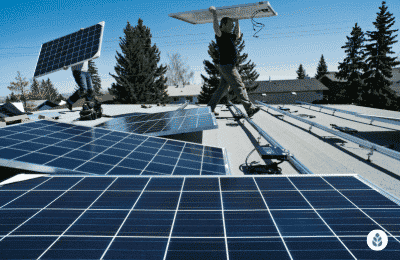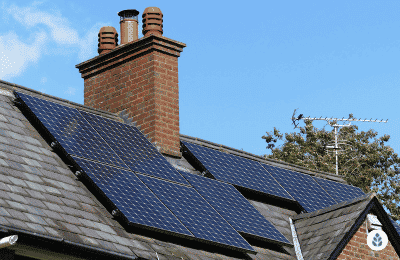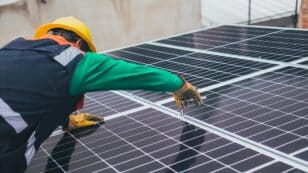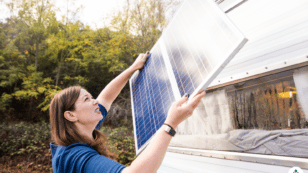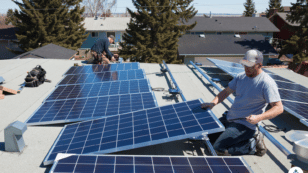
Top 6 Best Solar Companies in Utah (2024 Reviews)
In this guide, you’ll learn:
- What are the most reliable and reputable solar companies in Utah?
- How can you save money when hiring a solar installer in Utah?
- What should you consider when choosing a solar company to install your equipment in Utah?
Each product and or company featured here has been independently selected by the writer. You can learn more about our review methodology here. If you make a purchase using the links included, we may earn commission.
Utah is the ninth sunniest state in the country and has some of the best state-level solar incentives. The average Utah household can expect to save an average of $14,751 by switching to solar, and that’s after the panels pay for themselves. Deciding to go solar in Utah is a no-brainer, but choosing one of the 60 solar installers available in the Beehive State, on the other hand, can be tough.
To make your life a little bit easier, we’ve gone ahead and analyzed the top solar providers in Utah, using our expertise to rank them based on the equipment they install, their familiarity with solar power in Utah, the customer service they provide and more. Here are the seven solar companies in Utah that have the most to offer.
What Are the Best Solar Companies in Utah?
We’ve spent hours upon hours looking at different solar companies in Utah to recommend. The following seven are the ones we believe are the best solar companies in Utah as a whole:
- SunPower: Best National Provider
- ADT Solar: Best Warranty Coverage
- Blue Raven Solar: Best Financing Program
- Smart Wave Solar: Best Regional Installer
- Mynt Solar: Best for System Customization
- ES Solar: Best Local Installer
- Creative Energies Solar: Best Customer Service
Compare Utah’s Top-Rated Solar Providers
SunPower is the best overall solar company in Utah, in our opinion, but ADT Solar and Blue Raven are also excellent choices. If you want to do business with a more Utah-centric company, check out Smart Wave Solar or ES Solar.
The following table provides a high-level overview of each company to give you a sense of how they stack up against one another side by side.
| Solar Providers | Superlative | Our Score | Avg Cost | Warranty | Financing Options | Get Quote |
| SunPower | Best National Provider | 5/5 | $$$$ | Minimum of 25 years for equipment, workmanship and production | Cash, solar loan, solar lease, PPA | Get Quote |
| ADT Solar | Best Warranty Coverage | 4/5 | $$$ | 25 years for equipment, workmanship and production | Cash or solar loan | |
| Blue Raven Solar | Best Financing Program | 4.5/5 | $$ | 25 years for equipment and efficiency, 10 years for workmanship | Cash or solar loan | Get Quote |
| Smart Wave Solar | Best Regional Installer | 4/5 | $$$ | 25 years for equipment, production and workmanship | Cash or solar loan | Get Quote |
| Mynt | Best for System Customization | 4/5 | $$ | 25 years for equipment, production and workmanship | Cash or solar loan | Get Quote |
| ES Solar | Best Local Installer | 4.5/5 | $$$$ | 25 years for equipment and production, lifetime workmanship coverage | Cash or solar loan | Get Quote |
| Creative Energies Solar | Best Customer Service | 4.5/5 | $$$$ | 25 years for equipment and production | Cash or solar loan | Get Quote |

SunPower
Pros
- Most efficient panels on the market
- National coverage
- Cradle to Cradle sustainability certification
- Great warranty coverage
Cons
- Expensive
- Customer service varies by local dealer

Blue Raven Solar
Pros
- Industry-leading in-house financing
- Competitive pricing
- Excellent reputation
Cons
- Doesn't offer solar batteries (coming 2022)
Blue Raven Solar easily has the best solar financing program of any solar company we’ve covered. The company offers two different financing programs in-house, making it extremely easy to pay for your solar system.
If you want to customize your solar system, Blue Raven isn’t the best choice since the company doesn’t offer many options.
Why We Chose Blue Raven as the Best Financing Program
Blue Raven’s financing program is leaps and bounds ahead of its competition’s options. The company’s in-house BluePower Plus+ program gives you 18 months of interest-free financing and still offers a fixed rate after that period. This makes it much easier to afford a solar system since you don’t need to have as much cash upfront but also don’t get hit with interest immediately.
In addition to its BluePower Plus+ program, Blue Raven also offers a Smart Start financing option that fixes your monthly payment for five years. During that time, Blue Raven will send you a check for the excess energy your system generates. After five years, your payments switch over to a regular payment structure.
Another great thing about Blue Raven is that the company was purchased by SunPower in 2021. That means you might be able to purchase Maxeon panels through Blue Raven and take advantage of the company’s outstanding financing options to make it easier to pay for them.
What We Don’t Like
Customization is not Blue Raven’s strong suit. The company’s options are more limited than other solar installers in Utah, so it’s not the best choice for people who want to fine-tune their system. Blue Raven does offer SunVault batteries in some areas, although it hasn’t expanded to widespread battery installations yet. It also doesn’t install EV chargers, which is a shame considering Utah has some of the best EV incentives in the country.
Another downside to choosing Blue Raven is that the company doesn’t offer leases or PPAs. While we don’t recommend these options to most people, including them would be nice for accessibility.
Read our full review of Blue Raven for more information.
Solar Products
Blue Raven carries a decent selection of tier-one panels from notable manufacturers like SolarEdge, Canadian Solar, Trina and Hyundai. The company also installs Maxeon panels in some areas since it was acquired by SunPower in 2021, although availability seems limited.
Unfortunately, Blue Raven doesn’t offer much in the way of other solar products or services. It appears the company is starting to offer SunVault batteries, but it hasn’t started offering solar batteries in all areas it serves yet.
You can get access to the Enphase solar monitoring app, as the company installs Enphase inverters alongside its panels.
Financing Options
The best loan option for most people is the company’s in-house BluePower Plus+ program, which gives you 18 months of interest-free financing to make a dent in your solar system’s cost. Keep in mind that you’ll be saving money on your monthly electric bill in that time, so you should be able to make significant progress towards paying off your system before interest kicks in.
We still recommend a cash purchase if you can make it work, as this will still deliver higher savings over time and lead to a faster panel payback period.
Warranty Information
All of Blue Raven’s solar systems are covered by a 25-year manufacturer’s warranty covering energy production and hardware. The company also offers a ten-year workmanship warranty to protect you from any issues that arise due to incorrectly installed systems.
The manufacturer’s equipment warranty and the labor warranty are both considered average, although the production warranty is slightly longer than what most other companies will offer.
Facts and Figures: Blue Raven Solar
| EcoWatch Rating |
|---|
| Better Business Bureau (BBB) Rating |
| Year Founded |
| Average Cost ($-$$$$$) |
| Solar Services |
| Brands of Solar Equipment Offered |
| Warranty Coverage |
| 4.5 |
| A+ |
| 2014 |
| $$ |
| Solar Panels, System Monitoring |
| Trina Solar, Canadian Solar, SolarEdge, Silfab, SunPower |
| 25-year manufacturer warranty; 10-year workmanship warranty, 2-year production guarantee |

Smart Wave Solar
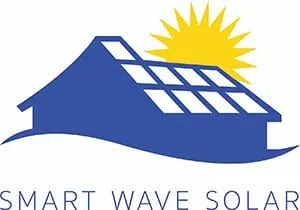
Local Service
Average cost
Pros
- Installations include backup power guarantee
- Outstanding customer service
- Offers rewards for customer referrals
- Great warranty coverage
Cons
- Limited brands of solar equipment available
Smart Wave Solar is a mostly-Utah-based solar installer with a solid reputation for providing outstanding customer service. The company also has a fantastic emergency backup service that guarantees you emergency power for free without a battery.
As a small regional installer, Smart Wave doesn’t have the same selection of brands you find from a larger national company.
Why We Chose Smart Wave as the Best Regional Installer
Five of Smart Wave’s six locations are in Utah, so the company is well-versed in the specifics of installing solar panels for Utah homeowners. The company uses an in-house team to perform its installations, and its knowledgeable team of locals will help you navigate Utah’s solar laws and solar incentive programs.
Smart Wave offers a unique emergency backup service that uses proprietary technology to keep your home up and running during power outages, even without a battery. Right now, the company is offering a free emergency backup system when you refer four households for a consultation.
Another benefit of choosing Smart Wave is the peace of mind you get from the company’s outstanding warranty. All Smart Wave solar systems come with 25 years of coverage for equipment, energy production and workmanship. The workmanship warranty is especially good and is 2.5x higher than the solar industry’s average.
What We Don’t Like
Smart Wave’s selection of solar panel systems is good but not great. The company is missing some premium options, so it’s not the best choice if you want to purchase a high-efficiency system.
The company’s relatively small size compared to the main national installers means its prices are often a touch higher than you can find from a larger installer. We think it’s worth paying a bit more for the first-class treatment you get from a small company like Smart Wave, but if cost is your main concern, Smart Wave might not be for you.
Solar Products
Brand variety isn’t one of Smart Wave’s strong points, but the company does offer a small selection of tier-one panels from well-known manufacturers. Smart Wave carries Silfab, SolarEdge, QCells and REC panels, which gives you a reasonable choice between panels with different efficiency ratings and price tags.
We’d recommend the QCells panels if you’re looking to keep costs down, as they have competitive efficiency ratings with a lower cost per watt. If you’re looking for maximum efficiency and energy production, the REC panels will likely serve you best.
In addition to its panel selection, Smart Wave also offers the following products and services:
- Enphase IQ batteries
- Enphase solar monitoring app
- Patented battery backups developed by Smart Wave
Financing Options
Smart Wave accepts cash and solar loans but doesn’t offer leases or PPAs. We don’t recommend leasing panels or entering into PPAs since you won’t save as much money as you will if you pay in cash or by loan. Plus, they don’t let you take the federal investment tax credit (ITC), which holds an average potential value of almost $6,500 in Utah.
Of the two options available, a cash purchase will serve you best. Cash purchases yield the highest energy savings over time, and they let you pay off your panels in the shortest amount of time possible.
Warranty Information
Smart Wave’s warranty covers hardware, labor and production for 25 years. The equipment and production guarantees are average, and the workmanship coverage is well above the industry average of ten years.
The workmanship warranty is the most helpful coverage you’ll get from this provider, especially given the inclement weather in Utah that can expose issues with the installation workmanship.
Facts and Figures: Smart Wave Solar
| EcoWatch Rating |
|---|
| Better Business Bureau (BBB) Rating |
| Average Cost ($-$$$$$) |
| Solar Services |
| 4 |
| A+ |
| $$$ |
| Solar Panels, Solar Batteries, Energy Efficiency Audits |

Mynt Solar

Regional Service
Average cost
Pros
- Outstanding customer service
- Speedy and efficient installations
- Representatives are experts on local policies
Cons
- Relatively young company
- Limited power production warranty
If Smart Wave’s lack of customization options doesn’t work for you, you should check out Mynt Solar. The company installs a wide array of high-efficiency panels from top manufacturers that will easily meet most Utahns’ energy needs.
Mynt Solar is relatively new on the solar scene, and its warranties aren’t as solid as we’d like to see.
Why We Chose Mynt Solar as the Best for System Customization
Mynt Solar offers more customization options than most solar installers, which is impressive for a relatively young company. All of the panels Mynt installs are tier-one panels with efficiency ratings well-suited to take advantage of Utah’s sunny weather.
Mynt also carries a variety of solar batteries, inverters, racks and EV chargers. This makes it easy for the company’s technicians to work with you to design the perfect system for you and your energy needs.
The company is primarily based in Utah, but it also has locations in California and Nevada. Mynt’s installers have more than five years worth of experience installing residential solar systems in the Beehive State, so they’re familiar with the specific solar requirements in Utah. Plus, the relatively small company size means its installers can help you file for local incentive programs in Utah to help you save on your system.
What We Don’t Like
Mynt Solar relies on manufacturer warranties to protect the equipment it installs, which means the length of the warranty you get depends on the equipment you purchase. In most cases, that means 25 years’ worth of coverage on equipment and production, but certain brands offer less coverage.
Mynt also doesn’t accept solar leases or PPAs, which means its systems and services are going to be less accessible than those from companies that have a wealth of financing options.
Solar Products
Mynt Solar installs solar equipment from top manufacturers like SolarEdge, QCells and REC. The company also makes it easy to customize the size of your solar system to meet your home’s specific energy needs.
If you’re looking to keep costs down, we suggest the panels from SolarEdge, as these are the most affordable on a per-watt basis. The REC panels will deliver the highest efficiency of the available options, and the QCells panels are a great intermediate option in terms of cost and performance.
The company offers the following solar products and services:
- Sense Home Energy Monitor
- Energy auditing
- LG Chem RESU 10h solar battery
Financing Options
Mynt Solar customers can pay for their systems in full with cash or finance their purchase with a solar loan. The company does not offer leases or PPAs. We don’t recommend PPAs and leases anyway, but it’s something to think about if that’s how you plan to pay for your solar system.
A cash purchase from Mynt is going to cost the most upfront, but if you can make it work, paying in cash will deliver the greatest financial benefits over time, as it allows you to avoid paying interest on your system.
Warranty Information
Mynt’s warranties are provided by the manufacturer and range from ten to 30 years, depending on the brand of panels you choose. The company offers a 25-year workmanship warranty which is significantly better than the industry standard of ten years.
The workmanship warranty is the most beneficial, in our opinion, as it provides peace of mind that your rooftop solar system will stand up well to the sometimes extreme weather in Utah.
Facts and Figures: Mynt Solar
| EcoWatch Rating |
|---|
| Better Business Bureau (BBB) Rating |
| Average Cost ($-$$$$$) |
| Solar Services |
| 4 |
| B- |
| $$ |
| Solar Panels, Solar Batteries, EV Chargers, Roofing Services, Energy-Efficiency Audits |

ES Solar
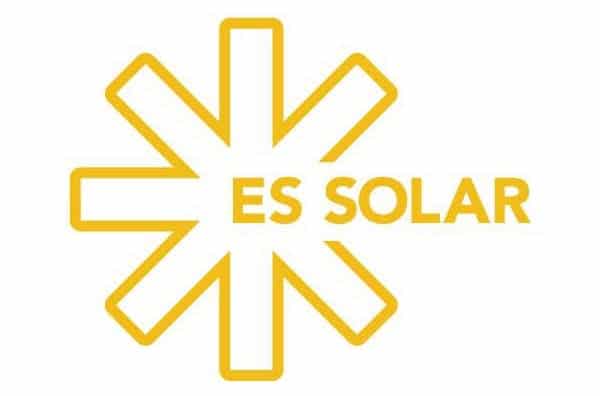
Local Service
Average cost
Pros
- Representatives are experts on local policies
- Lifetime workmanship warranty
- Outstanding customer service
Cons
- No leases or PPAs
- Energy audits only available 12 months after installation
ES Solar is another Utah-based installer — like Mynt and Smart Wave — but with over two decades of experience, making it our pick for the best local installer in the Beehive State. The company’s representatives and technicians are intimately familiar with the solar landscape in Utah and know what types of systems work best in the state.
Why We Chose ES Solar as the Best Local Installer
ES Solar has more than 20 years of experience installing solar panels in Utah, a great reputation for customer service and one of the best workmanship warranties in the country. The company has somewhat recently expanded to service some parts of Nevada and Wyoming, but the bulk of its experience comes from performing residential installations throughout Utah.
One of the best aspects of choosing ES Solar is the company’s unbeatable lifetime workmanship warranty. Utah’s extreme weather can easily damage an improperly installed solar panel system, so having a lifetime labor warranty is a massive plus. Any company that’s willing to stand by its work forever is absolutely worth a look, in our opinion.
ES Solar’s customer service is also excellent, with many customer reviews praising the company for its professionalism, friendliness, and knowledge. Plus, the techs are all locally trained, so they can help you save by filing for local incentives and solar perks.
What We Don’t Like
One of the only downsides to going with ES Solar is that the company only offers energy audits starting one year after your installation, which makes it difficult to assess your system’s function early on.
Another small annoyance is that the company doesn’t offer leases or PPAs, so it might be more difficult for some people to afford a solar panel system from ES Solar. We don’t recommend PPAs or leases, but having more financing options can be helpful for improving overall accessibility.
Solar Products
ES Solar doesn’t publish information about the panel brands it installs. However, based on customer reviews, it appears it works with a few different tier-one manufacturers like QCells, REC and Silfab.
We suggest the REC panels for maximum power output, as they have an efficiency rating of up to 22.3%. The QCells panels are the most affordable option, so they can help you save some money on your installation.
The company offers the following additional products and services alongside its selection of panels:
- sonnenCore solar battery
- Sonnen monitoring app
- EV chargers — brands aren’t mentioned on the company website
- Home energy audits, but only a year or more after the installation is completed
Financing Options
ES Solar accepts cash and solar loans but doesn’t offer leases or PPAs. We don’t see this lack of financing options as a big loss since owning your panels will save you more money in the long run than leasing or entering a PPA.
As is the case with other providers, we recommend a cash purchase for long-term savings and the fastest possible panel payback.
Warranty Information
ES Solar’s warranty covers equipment and production for 25 years. The equipment warranty is in line with the industry average, and the efficiency warranty is slightly longer than average.
Most importantly, the company guarantees its workmanship for life, which is a major selling point and one of the main reasons ES Solar is our choice for the best local installer in Utah. The typical labor warranty only lasts for five years, so this is a major improvement over what most other companies offer.
Facts and Figures: ES Solar
| EcoWatch Rating |
|---|
| Better Business Bureau (BBB) Rating |
| Average Cost ($-$$$$$) |
| Solar Services |
| 4.5 |
| Not Rated |
| $$$$ |
| Solar Panels, Solar Batteries, EV Chargers, Energy-Efficiency Audits |

Creative Energies Solar

Regional Service
Average cost
Pros
- Certified B Corp
- Outstanding customer service
- Many years of experience
- Multitude of products and services
Cons
- No leases or PPAs
- Slightly expensive
Creative Energies Solutions distinguishes itself from other Utah solar companies by offering fully customized solar systems. The company tailors each of its systems to the customer’s needs and can accommodate special requests like 100% off-grid systems and efficiency upgrades.
The only major downside is that the company’s systems can be quite expensive.
Why We Chose Creative Energies Solutions as the Best for Customer Service
Creative Energies Solutions’ main selling point is that it can craft a fully customized solar system to meet your home’s specific needs. Other companies can offer panels from different brands and a small selection of storage options, but no off-the-shelf solar installation will fit your home better than a bespoke system from Creative Energies Solutions.
Creative Energies Solutions is also one of the few Utah companies that offer SunPower’s Maxeon panels. If you want the most efficient residential panels on the market but prefer to use a local installer, Creative Energy Solutions is your best bet.
Another thing we like about Creative Energy Solutions is that the company is a certified B Corp. Companies that meet the requirements to be a B Corp are dedicated to bettering the communities they’re a part of and must be environmentally responsible, which is a major benefit to supporting Creative Energies Solutions, in our opinion.
What We Don’t Like
One of the only things we don’t like about Creative Energy Solutions is the cost of its systems. If you want a customized solar system with Maxeon panels, be prepared to pay a pretty penny. In general, we think that paying for a high-quality custom system can be the right move for some people, but it’s not the right choice for everyone and could make clean energy inaccessible for some customers.
Otherwise, the only minor blemish on the company’s otherwise excellent reputation is that it doesn’t offer leases or PPAs. We don’t view that as a major loss, but it’s something to consider.
Solar Products
Creative Energy Solutions primarily installs solar panels from SolarEdge and REC. SolarEdge panels have lower efficiency ratings than what you’ll find from companies like Maxeon or REC but deliver plenty to take advantage of Utah’s sunny weather. REC solar panels are a bit more efficient — and expensive — with efficiency ratings up to 22.3%.
The company also offers a plethora of energy storage solutions, monitoring options, and custom systems, including the following:
- Tesla Powerwall batteries
- Tesla solar monitoring app
- Enphase IQ batteries
- Enphase solar monitoring app
- Hybrid solar systems
- Off-grid solar systems
Financing Options
Creative Energies Solutions accepts cash and solar loans but doesn’t entertain leases or PPAs. The company recommends financing through the Clean Energy Credit Union, although the two companies are not formally affiliated. Clean Energy Credit Union specializes in helping homeowners finance the switch to solar power and offers reasonable rates to qualified customers.
Still, we recommend a cash purchase for most residents, as this will deliver the fastest panel payoff and the most savings over time.
Warranty Information
Creative Energies Solutions’ warranty covers energy production and the equipment for 25 years. The equipment warranty is in line with the industry average, and the efficiency guarantee is about five years longer than the average.
CES also backs its work with a 25-year labor warranty that includes a no-leak roof guarantee. This is outstanding coverage to have in a place like Utah, where above-average annual snowfall can expose your system to moisture for extended periods of time and promote leaking. Most companies don’t include a dedicated roof leak warranty.
Facts and Figures: Creative Energies Solar
| EcoWatch Rating |
|---|
| Better Business Bureau (BBB) Rating |
| Average Cost ($-$$$$$) |
| Solar Services |
| 4.5 |
| Not Rated |
| $$$$ |
| Solar Panels, Solar Batteries, EV Chargers, Off-Grid Solar Solutions, Electrical Work |
Watch Below: Is Solar Actually Worth It? What’s True vs What’s a Myth
How Can You Save Money When Hiring A Solar Company In Utah?
Utahns pay an average of $3.15 per watt for solar equipment and require systems that total around $25,200 before any incentives. Despite being below average for the U.S., this is still prohibitively expensive for many homeowners to pay initially.
Luckily, there are a few things you can do to keep your costs when searching for an installer and throughout the conversion process. We’ll discuss these money-saving tips below.
- Make sure to take advantage of solar benefit programs
- Choose a panel with a high efficiency rating
- Get free quotes from a few different installers
Take Advantage of Utah’s Solar Incentive Programs
By far, the best thing you can do to bring down your effective solar panel cost is to file for all of the incentives you have available to you. The table below includes a quick look at some of the more beneficial incentives, but you can check out our complete guide to solar incentives in Utah for more information and instructions on how to apply for these.
| Solar Benefit Program | Program Description |
| Federal Solar Investment Tax Credit (ITC) | The federal solar tax credit is for 30% of your entire system value, including panels, batteries and inverters. The credit gets applied to your income tax liability, which means your tax bill will decrease by the credit amount. This can effectively save you an average of $7,560 in UT. |
| Utah Renewable Energy Systems Tax Credit (RESTC) | This is a state credit that works similarly to the ITC; a certain percentage of your system value is credited to your state income tax burden and effectively reduces your system cost. The credit is for 25% of your system or $400, whichever is lower. This is scheduled to expire on December 31, 2023, so it will no longer be available in 2024 or beyond. |
| Rocky Mountain Power Wattsmart Battery Program | This perk is for customers of Rocky Mountain Power only. It provides a rebate for solar storage solutions to bring down the upfront cost of installing a solar battery backup alongside your panels. |
| Net Metering | Net metering credits you for the energy you generate that you don’t use right away and instead send to the electric grid. You can use your earned credits to reduce future bills for periods when you have to pull energy from the grid. The net metering program isn’t mandated in the state, so only some power companies will offer it. |
Choose a Panel With a High Efficiency Rating
Another great way to save money in the long run in Utah is to choose a panel brand that has a high efficiency rating — like SunPower, Tesla, REC, Panasonic or Qcells. The efficiency rating is a measurement of how much of the available sunlight the panel can convert into electricity. The higher the rating, the more power your panels will generate in all conditions. This means that the more efficient your panels are, the fewer you’ll need to purchase.
The efficiency rating of your panels is important no matter where you live, but it’s especially crucial in an area like Utah. Utah property owners can experience wildly different climates depending on their area, with some receiving far more snow or rainfall relative to the rest of the country. The state as a whole sees around 60 inches of snow, which is more than double the national average, and some cities see far more than that.2
When significant snow falls on your panels, it will obstruct the sunlight from getting to them and reflect a good portion of it away from your home. A reduction in the available sunlight when your panels are covered will lead to overall lower amounts of electricity generated with your system, and high-efficiency panels can help maximize the amount you produce year-round.
This helps boost your long-term savings, which maximizes your return on investment.
Get Multiple Solar Quotes
Finally, we recommend calling a handful of companies to get estimates for your solar energy system. Utah is home to around 50 installers, all of which can come up with a different price for your system.
Most companies offer free quotes, and many can get roundabout estimates using satellite imaging of your property. You can get a few different prices without having to have multiple companies come out to your home.
We suggest getting a few quotes and then choosing the one that suits your budget and is likely to meet your energy needs.
You can use our solar calculator to get an idea of how much your solar system will cost and estimate how much you’ll save by going solar in Utah.
Will Solar Increase Your Home Value In Utah?
Yes! Converting to solar not only saves you an average of over $10,000 on energy bills after your panels pay for themselves, but your system will also raise your property value.
Research from Zillow suggests that homes with solar installed sell for 4.1% more.3 Given the average home value of $557,171, that’s a typical increase of approximately $22,844.4
In some cases, panels can make your home a bit less desirable to some buyers who don’t like the appearance of rooftop solar panels, if that is your worry there are solar shingle options like Tesla’s solar shingles that can be a good alternative to panels. However, Utah is a relatively eco-friendly state and has long been an adopter of renewable energy.5 It’s likely that more homeowners in Utah will be accepting of solar and see it as a valuable asset when buying a home.
Additionally, we should mention that solar is more popular in some areas of Utah than others. Heavy clean energy adopters include Alta, Park City, Oakley, Ogden, Moab, Springdale, Salt Lake City and more.6 Panels are popular outside of these areas as well, but you’re most likely to see the biggest property value bump in these areas.
Should Utah Residents Hire a Professional Solar Installer Or DIY?
It’s always tempting for prospective solar adopters to consider DIY solar installation. Doing the installation yourself is significantly more affordable, but there are a few reasons we strongly recommend hiring a professional instead. These include:
- Panel efficiency is lower for DIY equipment
- Permitting can be expensive and require strict adherence to the guidelines
- DIY warranties are much less appealing
We’ll discuss these points in greater detail below.
Panel Efficiency Is Lower for DIY Panel Brands
One of the primary reasons we recommend against DIY solar installations in Utah is that the DIY panels available for homeowners to install have a much lower efficiency rating than professionally-installed options.
As mentioned above, efficiency is a crucial thing to consider in Utah. Although the Beehive State sees more sunny days per year than most states, snow coverage is also above-average in UT and will naturally decrease production throughout the winter.7 We recommend opting for professionally-installed panels to maximize production and long-term savings.
Permitting Is Challenging If You Lack Experience
All municipalities in Utah require solar panels to be permitted before installation. Pulling permits isn’t terribly time-consuming or difficult, but installing your panels according to your city’s guidelines can be a challenge, especially if you have no experience doing so.
Professional solar panel installation companies work with building departments every day and know how to get things done correctly the first time. If you choose a DIY installation to save money but don’t follow the permitting guidelines exactly, you could end up with a solar panel system that needs to be reinstalled or adjusted by a professional anyway.
We recommend going with a professional from the get-go. This will be more expensive, but you’ll at least know things are installed properly and safely.
Warranty Coverage is Lacking for DIY Solar Equipment
Finally, a DIY installation won’t come with any warranty for the labor, and the coverage for the equipment and power production is usually lacking.
A guarantee that your panels are installed properly is always helpful but especially in UT. Above-average amounts of snowfall and rainfall in the area can leave your roof prone to leaking and your photovoltaic (PV) system prone to damage. Ultimately, that damage can end up being far more costly than it would be to pay a professional installer in the first place.
Plus, you’ll likely pay around $10,000 for a DIY system and get between five and ten years of protection for your equipment and just a few years covering efficiency. Professional systems are about double the price once you factor in materials and labor, but you get protection for three times as long in many cases.
The peace of mind of hiring a solar professional is worth it in Utah, in our opinion, but you could also end up saving money, as the DIY panels would need replacement in a shorter amount of time.
What Should Utah Residents Look For in a Solar Installer?
With a wide variety of installers to choose from in Utah, picking the one that meets your needs and fits into your budget best can be a time-consuming process. There are a lot of factors you should consider when choosing an installer, but we’ll include what we believe are the most important below.
- Warranty coverage
- Local experience
- Panel brands offered
Warranty Coverage Provided
First off, we recommend prioritizing the warranty coverage offered by different solar panel companies. Solar power systems are expensive in UT, so having a complete protection plan for yours can provide peace of mind and can end up saving you money if you ever need repairs or replacements.
We suggest prioritizing the warranties offered for efficiency and workmanship since UT doesn’t experience much in the way of extreme weather that can damage your panels.
These types of coverage will help ensure your panels produce sufficient energy to offset losses when it snows and will keep your home protected from the snow and rain that is so common in the area.
Breadth of Experience
Solar has become increasingly popular in Utah over the past decade, and with an increase in demand has come a slew of new installers popping up to capitalize. Unfortunately, young solar companies are far more likely to go out of business, at which point your warranties will be voided.
For this reason, we recommend choosing a company that has years of experience — at least five but ideally more than ten — in solar. This will also help ensure you get a company that understands the needs of Utah property owners specifically and will size your system appropriately for your energy needs and your property’s sun exposure.
Panel Brands Offered
Finally, we suggest looking carefully at the panel brands offered by the companies you’re considering. Every installer carries a specific set of panel brands that vary in their efficiency rating, durability and price.
We suggest prioritizing the efficiency rating of the panels offered first, especially if your roof is medium or small in size. High-efficiency options are more likely to generate enough energy to offset your electric bills in Utah, even through the winter, when production naturally drops due to snow coverage.
Next, we suggest sorting by overall price and the quality you get for the cost. Panels are a bit more expensive in Utah on a per-watt basis than they are in most other states, so opting for an affordable brand of solar panels that provides good quality is wise.
The cost information presented in this article is derived from a comprehensive analysis, incorporating data from multiple industry sources. The average cost per watt per state was calculated based on figures from Consumer Affairs, Energy Sage, and Berkeley Lab’s Electricity Markets & Policy Department. Additionally, monthly energy consumption and the average monthly cost of electricity were sourced from the U.S. Energy Information Administration, ensuring a well-rounded and accurate representation of the information presented.
Methodology: How We Reviewed the Best Solar Companies in Utah
We analyzed a significant fraction of the 128 solar installers that work in Utah to bring you only the best of the best. Our analysis was fine-tuned to address the specific needs of Utah residents and optimized to select companies that work best for a majority of people.
The following list describes the six primary criteria we used to rank companies, including the individual weights we used to arrive at our final scores.
- Local reputation and reviews (20%): Given the increased interest in renewable energy sources, Utah has seen major growth in its local solar industry. Some companies intend to capitalize on this boom without focusing on customer service and quality. We thoroughly examined customer reviews to identify companies that are consistent in delivering excellence and meeting or exceeding customer expectations.
- Pricing and financing (20%): The cost of solar equipment is lower in Utah than it is in many states, but it is still a large investment for most households, with an average pre-incentive installation cost of $21,440. Companies that offer competitive pricing without compromising quality are given preference in our ratings. Additionally, with Utah’s range of income brackets, we also prioritize companies that provide various financing options that make solar energy more accessible to a larger fraction of the state’s population.
- Services offered (20%): Utah has a varied geography and climate, which can affect the output of your solar panels. We rank companies that offer services like backup batteries, energy management systems and other add-ons higher than companies with fewer options. Electric vehicle (EV) charging systems are also growing in popularity in Utah, in particular, so companies offering EV charging stations score better in our lineup.
- Warranty coverage (20%): Utah experiences a variety of weather conditions ranging from heavy snow in the mountains to hot summers in the valleys. We value companies that offer comprehensive warranties, especially workmanship warranties, that ensure your system is protected against a variety of weather-related damages. Efficiency and equipment warranties are also important to ensure the system performs optimally over time but have less variation between companies and therefore have a smaller effect on our ranking.
- Company experience (10%): With Utah’s unique geographic conditions and regulatory landscape, experience in the local market is extremely important. We prioritize companies that have operated in the Utah market for a substantial period and understand the intricacies of the state’s solar industry. Their longevity often indicates a stable business and a better chance of honoring long-term warranties.
- Brand quality (10%): We assess the quality of the brands offered by each provider, with a preference for companies that offer high-efficiency panels suitable for Utah’s varying conditions. A selection of brands that offer several cost-effective and high-efficiency options is also important for catering to different customer requirements in the state.
FAQ: Best Solar Companies in Utah
Below, we’ll answer some of the questions we see most frequently about choosing a solar installer in UT.
Utah already enjoys low electricity rates. But coupled with utilities like Rocky Mountain Power that are solar-friendly, solar can be worth it in Utah so long as your roof receives enough sunlight, and your electricity bills are high enough to justify it.
Bigger national companies in Utah (Sunpro, Solcius, SunPower) are not always the best option in Utah. The benefits of a larger company can include better technology, speed of the installation service, and warranty, but not always. Smaller companies may offer more personalized service, better prices, and more intimate knowledge of local weather and policy. In fact, a recent report by the U.S. government found that large solar installers are $2,000 to $5,000 more expensive than small solar companies.
Solar installations vary in utility and complexity, so the most reputable company for the gig will depend on the services you’re looking for. As far as we’re concerned, the five companies ranked above are in a five-way tie for most reputable in Utah. It just depends on what you need. From there, we’d recommend prioritizing the factors that are most important to you. Do you want a company that gives back to the community? Offers cutting-edge technology? Or is a company that will answer the phone any time you call most important to you?
We don’t love to list the worst of the worst, but we’re happy to clarify why certain solar energy companies didn’t make the list. You may find Ion Solar, Sunrun, Sunpro, Solcius, and SunPower on competing sites. We didn’t exclude them because they’re poor companies, instead, we prefer only to highlight the best of the best. Luckily, many stellar companies make their homes in the Beehive State, beating out even names like SunPower. Review our criteria to see how we rated Utah’s solar installers.
Related articles
Top Solar Installers in Utah Cities
Comparing authorized solar partners
-
- Most efficient panels on the market
- National coverage
- Cradle to Cradle sustainability certification
- Great warranty coverage
- Expensive
- Customer service varies by local dealer
A+Best National Provider1985SunPower Panels25-year all-inclusive warranty
Having trouble deciding? Click below and use our process to receive multiple quotes instead:

 233k
233k  41k
41k  Subscribe
Subscribe 


